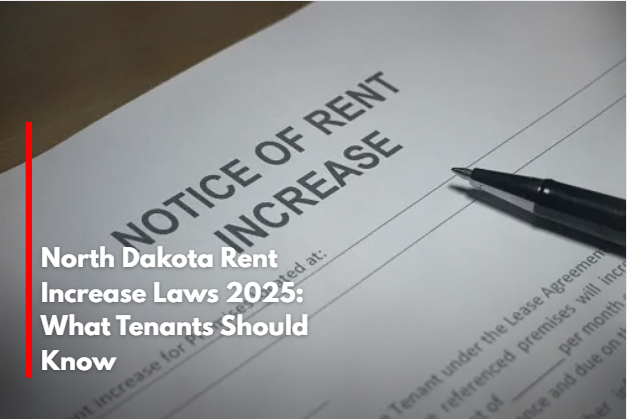In 2025, North Dakota remains a landlord-friendly state with no statewide rent control laws. This means there is no legal cap on how much a landlord can increase rent. Landlords have broad discretion to raise rents by any amount they choose.
The state law does not mandate landlords to justify rent hikes based on improvements or market conditions. However, landlords must provide proper notice before implementing any rent increase, and rent increases cannot be retaliatory or discriminatory.
Notice Requirements for Rent Increases
North Dakota law requires landlords to give tenants advance written notice before a rent increase takes effect. For month-to-month tenancy agreements, landlords must provide at least 30 days’ notice. This notice must specify the new rental amount and the effective date of the increase.
For fixed-term leases, such as annual leases, rent cannot be increased during the lease term unless the lease agreement specifically allows it. Rent increases can only occur at the end of the lease term, with notice provided ahead of renewal.
In the case of mobile home park rentals, landlords must give a longer 90-day notice before raising rent.
Failure to provide proper notice renders the rent increase invalid, and tenants are not obligated to pay the increase until proper notice is given.
Frequency of Rent Increases
While North Dakota does not limit how many times a landlord can increase rent, a typical practice is to raise rent no more than once every 12 months for periodic tenancies. However, the law does not explicitly prohibit multiple increases as long as proper notice is provided each time.
Tenants should carefully read their lease agreements to understand any specific clauses about rent increases and frequency. The lease terms may provide additional protections or limitations beyond state law.
Protections Against Illegal Rent Increases
North Dakota tenants have protections against discriminatory or retaliatory rent increases. Landlords cannot raise rent based on protected classes such as race, religion, sex, disability, or familial status. Similarly, increasing rent to retaliate against tenants who exercise legal rights—like filing complaints about unsafe living conditions—is illegal.
Tenants who believe their rent increase is retaliatory or discriminatory can seek legal advice or contact tenant rights organizations to challenge the increase.
Tenant Options and Considerations
Tenants receiving a rent increase notice should:
Review the lease and local laws to verify the landlord followed proper procedures.
Negotiate with landlords if the increase seems excessive.
Consider whether to accept the increase or provide notice to terminate the tenancy within the required timeframes.
Keep written records of all communications regarding rent increases.
Planning ahead for potential rent increases is important, especially given the lack of caps on increase amounts in North Dakota. Tenants might want to budget for higher rent or look for alternative housing if the increase is unaffordable.
North Dakota’s rent increase laws in 2025 give landlords wide latitude to raise rents without limit, provided they give the required written notice—30 days for month-to-month and longer for fixed leases or mobile home parks. While no caps on increases exist, illegal increases based on discrimination or retaliation are prohibited. Tenants should stay informed, review notices carefully, and understand their rights and options when facing a rent hike.
Sources
(https://www.hemlane.com/resources/north-dakota-rent-control-laws/)
(https://www.steadily.com/blog/how-much-can-a-landlord-raise-rent-in-north-dakota)
(https://attorneygeneral.nd.gov/consumer-resources/tenant-rights/)
(https://www.steadily.com/blog/rent-increase-laws-regulations-north-dakota)
(https://innago.com/north-dakota-landlord-tenant-laws/)











